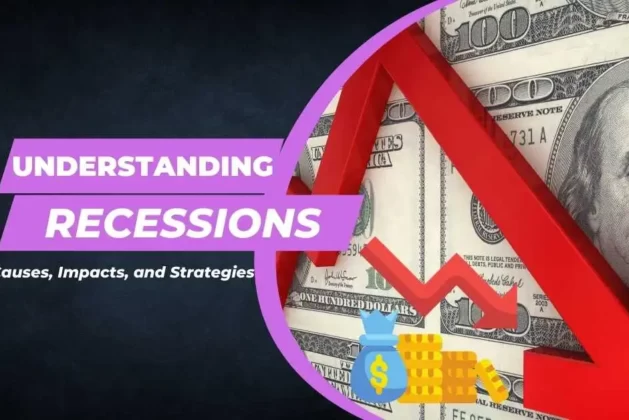Table of Contents
ToggleIntroduction
A recession is a term commonly used in economics to describe a period of significant economic decline. It is characterized by a decrease in economic activity, including a decline in GDP, employment rates, and investment. It can have a profound impact on individuals, businesses, and entire nations, often leading to financial hardships and widespread challenges.
In this article, we will explore the impact of recessions, discuss ways to deal with them, examine countries facing maximum inflation, and delve into the experiences of common people during these challenging times. Additionally, we will provide insights into how individuals can beat inflation individually.
Impact of Recession

Recessions can have far-reaching consequences on various aspects of an economy and the lives of people within it. Here are some key areas that are typically affected during this phase:
- Unemployment: During a economic decline, companies often face reduced demand for their products or services, leading to cost-cutting measures such as layoffs and hiring freezes. High unemployment rates can result in financial insecurity for individuals and families, making it challenging to meet basic needs and increasing the risk of poverty.
- Business Failures: The decline in consumer spending during a recession can significantly impact businesses, particularly small and medium-sized enterprises (SMEs). Many businesses struggle to stay afloat due to reduced revenue, leading to closures and bankruptcies. The loss of jobs and economic instability further exacerbate its impact.
- Stock Market Volatility: It typically coincide with significant fluctuations in the stock market. Investors tend to become more cautious, leading to lower stock prices and increased volatility. This can result in substantial losses for individuals and institutional investors, affecting portfolios and retirement savings.
- Housing Market: The housing market is often heavily impacted during recessions. As unemployment rises and consumer confidence declines, demand for homes decreases, causing property prices to fall. This can lead to negative equity for homeowners and difficulties for those looking to sell or purchase properties.
Ways to Deal with a Recession

Governments and individuals can adopt various strategies to mitigate the impact of a recession. Here are some common approaches:
- Fiscal Policy: Governments can implement expansionary fiscal policies during it to stimulate economic activity. This includes increasing government spending on infrastructure projects, providing tax incentives to businesses, and implementing measures to support employment and consumer spending.
- Monetary Policy: Central banks play a crucial role in managing it through monetary policy. They can lower interest rates to encourage borrowing and investment, making it cheaper for businesses and individuals to access credit. Additionally, central banks can implement quantitative easing measures to inject liquidity into financial markets.
- Support for Small Businesses: Small businesses are often hit hardest during deflation. Governments can provide targeted support, such as grants, low-interest loans, and business advisory services, to help them weather the economic downturn. This assistance can help preserve jobs and maintain local economies.
- Enhancing Social Safety Nets: During recessions, governments can strengthen social safety nets to provide a safety net for individuals and families. This may include expanding unemployment benefits, offering job retraining programs, and implementing policies to prevent homelessness and hunger.
Countries Facing Maximum Inflation

Inflation is another significant concern during recessions, as it erodes the purchasing power of individuals and can further exacerbate economic challenges. Some countries have faced particularly high levels of inflation during economic decline. Here are a few examples:
- Venezuela: Venezuela has experienced hyperinflation in recent years, with prices skyrocketing and the value of the local currency plummeting. The country’s ongoing political and economic crisis, coupled with mismanagement and corruption, has contributed to this severe inflationary environment.
- Zimbabwe: Zimbabwe faced hyperinflation in the late 2000s, with inflation rates reaching astronomical levels. Factors such as economic mismanagement, political instability, and the printing of excessive amounts of money led to the devaluation of the Zimbabwean dollar and a severe erosion of purchasing power for its citizens.
- Argentina: Argentina has a history of recurring inflationary periods. Economic mismanagement, high levels of government debt, and political uncertainty have contributed to the country’s inflation challenges. This has led to a loss of confidence in the local currency and increased economic hardships for the population.
Suggested Blog:-
Unlocking the World of Digital Real Estate | Metaverse
Experiences of Common People during Recession

During recessions, common people often face significant financial difficulties and undergo various challenges. Here are some real-life examples that shed light on the experiences of individuals during these periods:
- Job Loss and Financial Struggles: Many individuals experience job loss or reduced working hours during this phase, leading to financial instability. For instance, during the global financial crisis in 2008, numerous families lost their homes due to foreclosure and struggled to afford necessities.
- Increased Debt Burden: It can push individuals to rely on credit cards, loans, and other forms of borrowing to cover expenses. However, accumulating debt during a recession can be particularly burdensome, as interest rates may be high, and individuals may face challenges repaying their debts.
- Reduced Retirement Savings: Stock market declines during recessions can significantly impact retirement savings and pension funds. Individuals nearing retirement may face the difficult choice of delaying their retirement or accepting a lower standard of living due to reduced investment returns.
- Mental Health Challenges: The stress and uncertainty associated with it can take a toll on individuals’ mental health. Increased anxiety, depression, and feelings of insecurity are common during these periods. Access to mental health support and services becomes crucial for those struggling emotionally.
How to Beat Inflation Individually
While individuals cannot directly control macroeconomic factors, there are steps they can take to beat inflation individually and navigate it more effectively. Here are some strategies:
- Diversify Investments: Diversifying investment portfolios can help individuals mitigate the impact of inflation. This involves allocating investments across different asset classes, such as stocks, bonds, real estate, and commodities. Diversification can potentially provide a hedge against inflation by spreading risk and capturing growth opportunities.
- Invest in Tangible Assets: Investing in tangible assets, such as real estate or precious metals, can be a hedge against inflation. These assets tend to retain value or appreciate over time, providing a potential store of wealth during periods of rising prices.
- Reduce Debt: Inflation erodes the value of money over time, but it can also reduce the real burden of debt. Individuals can take advantage of this by strategically reducing high-interest debt during inflationary periods. Paying off loans and credit card debt can provide financial relief and improve long-term financial stability.
- Focus on Skill Development: Enhancing skills and knowledge through education, training, and certifications can boost employability and increase earning potential. During a recession, individuals with valuable skills and expertise are better positioned to secure employment or negotiate higher salaries.
Causes of Recession

Recessions are complex economic phenomena that can be triggered by a combination of factors. While the specific causes may vary from one recession to another, several common factors contribute to the onset of an economic downturn. Here, we will explore some of the key causes of recessions:
- Economic Overproduction and Inventory Buildup: One of the fundamental causes of recession is excessive production and inventory buildup. When businesses produce more goods or services than the market demands, it can lead to a surplus of inventory. As a result, businesses may cut back on production, leading to layoffs, reduced consumer spending, and a decline in overall economic activity.
- Financial Crises and Credit Crunch: Financial crises can play a significant role in triggering recessions. When the financial sector experiences a crisis, such as a banking crisis or a housing market crash, it can lead to a credit crunch. Banks and other financial institutions become more reluctant to lend, which reduces access to credit for businesses and consumers. This lack of credit can have a severe impact on investment, consumption, and overall economic growth.
- The bursting of Asset Bubbles: Asset bubbles occur when the prices of certain assets, such as real estate or stocks, become significantly inflated compared to their intrinsic value. When the bubble bursts, it can lead to a sharp decline in asset prices, causing significant wealth destruction and negatively affecting consumer confidence. This can lead to a decrease in consumer spending and investment, contributing to a recession.
- Changes in Consumer Spending Patterns: Consumer spending is a crucial driver of economic growth. Changes in consumer behavior, such as reduced spending due to economic uncertainty or shifts in preferences, can have a significant impact on the overall economy. For example, during an economic downturn, consumers may prioritize essential goods and services over discretionary purchases, leading to decreased demand in certain sectors and a subsequent decline in economic activity.
- Global Economic Imbalances: Global economic imbalances, such as trade deficits, can also contribute to the onset of recessions. When countries have persistent trade imbalances, it can result in a buildup of debt, currency fluctuations, and reduced competitiveness in certain sectors. These imbalances can create vulnerabilities in the global economy, making it more susceptible to economic decline and economic downturns.
It is important to note that recessions are often the result of a combination of multiple factors interacting with each other, rather than a single cause in isolation. Additionally, the severity and duration of a it can vary depending on the specific circumstances and the policy responses implemented by governments and central banks. Understanding the causes of recessions can help policymakers and economists develop strategies to mitigate their impact and promote economic stability.
Conclusion
Recessions are challenging economic periods that have wide-ranging impacts on individuals, businesses, and countries. High unemployment rates, business failures, stock market volatility, and inflation are some of the consequences commonly experienced during recessions.
Governments can employ fiscal and monetary policies to mitigate the impact while supporting small businesses and enhancing social safety nets. Countries like Venezuela, Zimbabwe, and Argentina have faced significant inflation challenges during recessions.
Common people often undergo financial struggles, job loss, and increased debt burden during these periods. However, individuals can take steps to beat inflation individually by diversifying investments, investing in tangible assets, reducing debt, and focusing on skill development.
By adopting these strategies, individuals can enhance their financial resilience and better navigate recessions and their associated challenges.
Frequently Asked Questions (FAQs)
A recession is a significant decline in economic activity characterized by a contraction in gross domestic product (GDP), a rise in unemployment rates, reduced consumer spending, business failures, and stock market declines. It is a period of economic downturn lasting several months or more.
The duration of a recession can vary, but they typically last for several quarters or even years. The length of a recession depends on various factors, including the underlying causes, the effectiveness of policy responses, and the overall resilience of the economy.
Recessions can have multiple causes, including economic overproduction, financial crises, bursting of asset bubbles, changes in consumer spending patterns, and global economic imbalances. Often, recessions are triggered by a combination of factors that interact and amplify each other.
Recessions can have a significant impact on individuals. They can result in job losses, reduced income, financial hardships, increased debt burdens, and a decline in the value of assets such as homes and investments. Individuals may experience difficulties in finding employment, face challenges in meeting basic needs, and suffer from increased levels of stress and uncertainty.
While individuals cannot control or predict recessions, there are steps they can take to better prepare themselves financially. Building an emergency fund, reducing debt, diversifying investments, and enhancing employability through skill development are all strategies that can help individuals weather the challenges of a recession. It is also important to stay informed about economic conditions and seek professional financial advice when needed.



